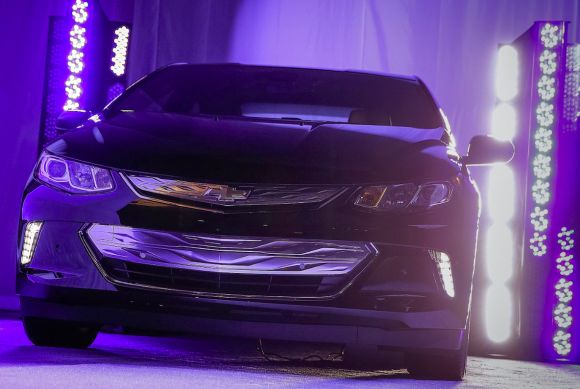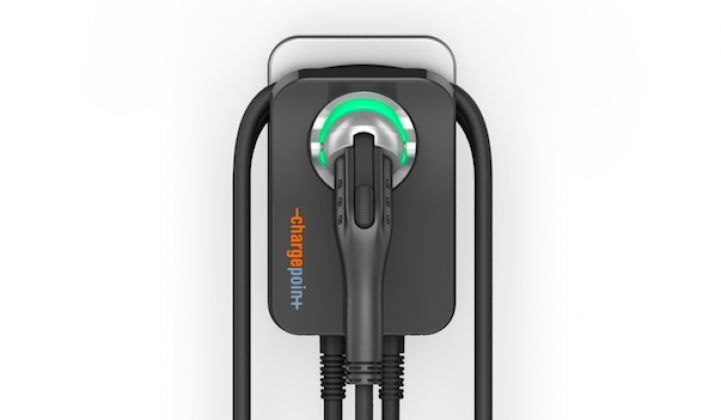Electric vehicles are picking up speed in the marketplace, but to really go mainstream, they still need to overcome the nuisance of charging.
ChargePoint, which currently operates a network of more than 20,000 public charging stations, entered the residential market yesterday with ChargePoint Home. The product -- billed as a smart, attractive, tablet-sized charger -- was unveiled at the International Consumer Electronics Show (CES) in Las Vegas.
All the ChargePoint Home needs for setup is a standard 240-volt outlet, no electrician required. It comes with a universal J1772 connector, plus customers have the option to buy cords of various lengths to suit their garage or in case they move. The charger is also Wi-Fi enabled, allowing for easy, remote management from a mobile app for up to 25 miles of charge per hour.
ChargePoint Home already works with the Nest Learning Thermostat, giving drivers the option to coordinate their energy use and minimize energy costs. Eventually, the charger could also participate in Nest’s demand response program dubbed “Rush Hour Rewards.”
The agreement isn’t limited to Nest, however. According to ChargePoint CEO Pasquale Romano, the company is open to collaborating with security companies and other home goods manufacturers, too.
ChargePoint is also building relationships with utilities, expanding on ties from its commercial charger business. Intelligent signaling will allow the company to seamlessly meter power to the car in response to price shifts. ChargePoint Home could also start participating in utilities’ demand response programs as early as 2016, said Romano.
“The whole idea is to make it simple for the driver,” Romano told Greentech Media. “Over the next couple of years, I think this is all going to evolve to where systems like ours will just figure out how to get the car charged as cheaply as possible, magically, without consumers having to think about it and so it’s always ready when they need it.”
ChargePoint Home is expected to hit the market this summer. In another recent announcement, ChargePoint revealed it is partnering with SunEdison to offer free home charging stations with the purchase of a solar array.
Romano didn’t give the price for ChargePoint Home, but said it would be competitive with non-networked chargers that are already available. Bosch currently offers one of the cheapest non-networked chargers for $450. Bosch’s networked model goes for $950. If Romano hits his target, ChargePoint Home could come in several hundred dollars cheaper than its competitors.
Swappable batteries and snakes
The startup Gogoro is taking a different approach to fast and convenient EV charging. The Taiwanese company unveiled a high-performance electric scooter at CES yesterday that never has to be plugged in.
The company's "Smartscooter" is designed to run-on small, swappable batteries that can be exchanged at a network of stations Gogoro plans to build out in major cities around the world. A free smartphone app directs drivers to “GoStations,” hubs where batteries can be swapped out in as little as 6 seconds.
Gogoro’s is not the first electric scooter, but it is one of the quickest and most efficient products around, with a top speed of 60 miles per hour and a 100-mile range. The Smartscooter uses the same Panasonic lithium-ion cells as the Tesla Model S. The pack itself is equipped with sensors and communication technology so that the GoStation automatically recognizes the scooter and pops out a fresh battery.
The company, headed by former HTC execs, quietly raised $150 million to build its urban scooter of the future. Over time, Gogoro’s modular battery-swapping infrastructure could serve other types of vehicles and products.
“Gogoro is more than a startup. This is the start of an industry,” said Horace Luke, co-founder and CEO, in a statement. “Our products and business model will impact a variety of consumer areas to create a metropolitan ecosystem with better connectivity, easier access to energy, and a more enjoyable urban living experience.”
The Smartscooter will be available sometime this year (Gogoro has not yet released the price).
Meanwhile, Tesla Motors recently announced it has started piloting a battery-swapping program at custom-built locations along the route from San Francisco to Los Angeles. The swap will take roughly three minutes for less than the cost to fill up the tank of a premium sedan.
Last week, Musk tweeted that Tesla is also working on a robotic EV charger that automatically reaches out from the wall and connects to a vehicle.
Btw, we are actually working on a charger that automatically moves out from the wall & connects like a solid metal snake. For realz.
— Elon Musk (@elonmusk) December 31, 2014While the description conjures up the image of supervillain Dr. Octopus' mechanical tentacles, the product is designed to be a force for good. The idea is to eliminate the need for manually plugging in a Tesla vehicle, making charging idiot-proof and overall EV ownership more convenient.
In other EV-related news, Chevrolet (very briefly) unveiled the 2016 Volt at CES on Sunday, but only long enough for a photo-op before the car was covered up again. Sales of General Motors’ flagship plug-in hybrid were lackluster in the final months of 2014, perhaps due to anticipation of the next-generation model. General Motors will officially debut the 2016 Volt at the North American International Auto Show in Detroit next week.
Details have yet to be released, but it’s anticipated the new model will have a longer electric range and fancier styling. The current Volt can travel up to 38 miles in all-electric mode before switching to gasoline.

2016 Chevrolet Volt. Photo Courtesy of General Motors.



